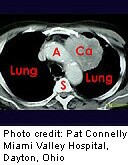
TUESDAY, May 4 (HealthDay News) — Treatment with the antibiotic azithromycin doesn’t improve the lung function of children and teens with cystic fibrosis, U.S. researchers report.
“A vicious cycle of infection and inflammation causes progressive lung destruction and premature death in patients with cystic fibrosis [CF]. Treatment strategies have therefore included both antimicrobial and anti-inflammatory agents,” Dr. Lisa Saiman, of Columbia University in New York City, said in a news release.
Over the past decade, studies have suggested that azithromycin, an antibiotic with both antimicrobial and anti-inflammatory activity, benefits CF patients.
Azithromycin is recommended as therapy for CF patients with chronic infection with the bacteria Pseudomonas aeruginosa, but there has not been enough evidence to support the benefit of azithromycin in other patients with CF, the researchers wrote.
This study, which investigated the possible benefits of expanding the antibiotic therapy to CF patients without the pathogen, included 260 children and teens with CF who were not infected with P. aeruginosa. They were randomly selected to receive either azithromycin or a placebo. After 24 weeks of treatment, there was no difference in lung function between the two groups.
However, researchers found that when compared with the placebo group, the azithromycin group had 50 percent fewer pulmonary exacerbations and 27 percent fewer patients who had to begin new oral antibiotics (other than azithromycin). On average, they also showed a 1.3-pound weight gain and a 0.34-unit increase in body-mass index (important because CF patients often need to gain weight). There were no differences in treatment groups in the use of intravenous or inhaled antibiotics or hospitalizations, Saiman and colleagues added.
They also found that patients who took the antibiotic had less cough and less productive cough than those in the placebo group.
“Further studies of azithromycin are warranted to further investigate its potential use” in CF patients not infected with P. aeruginosa, the researchers concluded.
The study appears in the May 5 issue of the Journal of the American Medical Association.
More information
The U.S. National Library of Medicine has more about cystic fibrosis.

